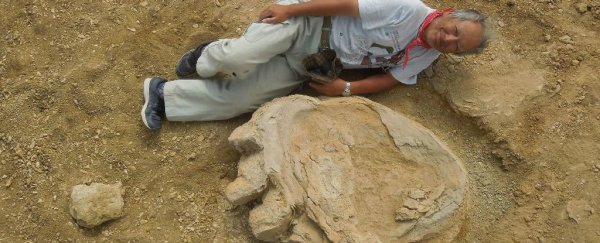One of the biggest-ever dinosaur footprints has just been uncovered in the Gobi Desert, an arid region that spans northern China and southern Mongolia.
Researchers unearthed the giant 77-centimetre-wide (30-inches-wide) prints on a Mongolian-Japanese expedition, and they say that it could offer new information about its owner.
The footprint is believed to have belonged to a titanosaur, a long-necked plant-eating dinosaur. They were some of the heaviest animals ever to walk the earth, weighing up to 90 tons (82 tonnes).
Titanosaurs were the last group of sauropods - the same group as the Brachiosaurus - who roamed the earth 90 to 66 million years ago.
The desert where the print was found is now covered in sand, but when dinosaurs were around, researchers suspect it would have been soft and muddy. Those conditions are likely why the print was preserved.
"This is a very rare discovery as it's a well-preserved fossil footprint that is more than a metre long with imprints of its claws," said the researchers in a statement from Okayama University of Science.
 AFP Photo/HO
AFP Photo/HO
But this isn't the first time in recent years that such a giant dinosaur print has been uncovered. Several massive dinosaur tracks have been discovered around the world.
In 2015, large footprints were found on the Isle of Skye in Scotland, which are believed to have also been made by sauropods. They measured 70 centimetres (27 inches) in diameter and were the first sauropod tracks to be found in Scotland.
And last August, researchers found the largest-ever carnivorous dinosaur prints in Bolivia.
The prints were 115 centimetres (45 inches) wide and believed to be tracks from an Abelisaurus - a cousin of the Tyrannosaurus rex.
These dinosaurs could grow to be over a whopping 12 meters (39 feet) tall and are thought to have lived around 70 million years ago.
The largest prints ever found were uncovered in France in 2009. They were nearly 2 metres (6.5 feet) wide and belonged to sauropods, the same species as the most recent discovery.
This article was originally published by Business Insider.
More from Business Insider:
